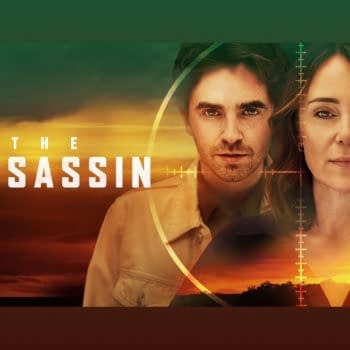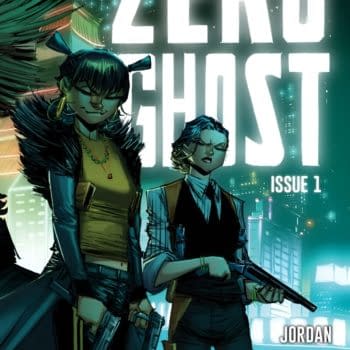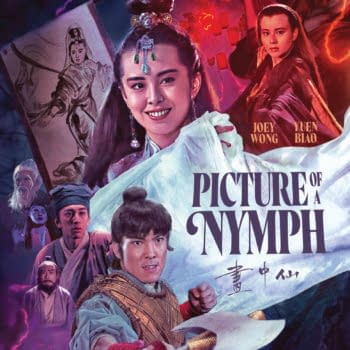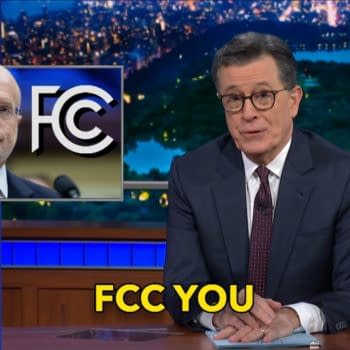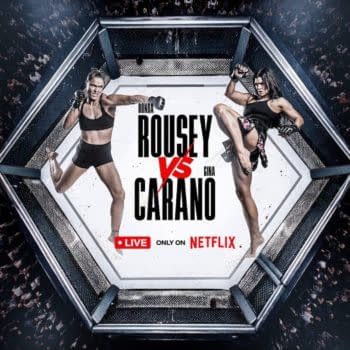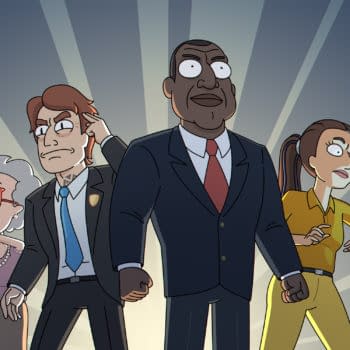Posted in: BBC, Doctor Who, TV | Tagged: bbc, david tennant, doctor who, Doctor Who: Doom's Day, multimedia event, Ncuti Gatwa, russell t davies, Sooz Kempner
Doctor Who: 5 Thoughts on "Doom's Day" (Including MVP Sooz Kempner)
Our thoughts on Doom's Day, an ambitious, elaborate, Sooz Kempner-starring multimedia event celebrating the Doctor Who 60th anniversary.
Doctor Who: Doom's Day is about Doom (embodied by up-and-coming UK standup comedian Sooz Kempner), reputedly the best freelance assassin from the 51st Century, who has only 24 hours left to live. Death is stalking her, and she has decided to take a job an hour across Time and Space in the hopes of finding The Doctor on one of those missions, hoping that he or she might help her stay alive. We've been following the event out of curiosity at whether they managed to pull this off, and we have some thoughts about what's out so far.
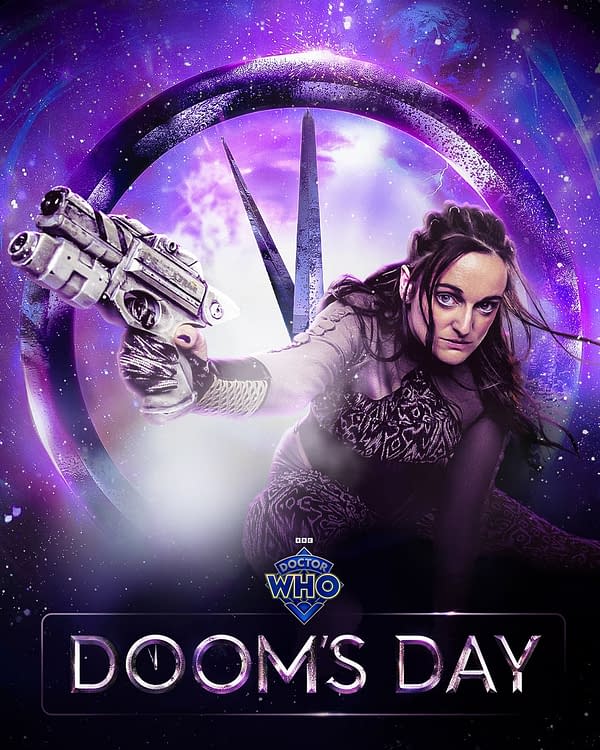
Why did "Doctor Who: Doom's Day" Come About?
We're perfectly happy with more Doctor Who stuff, including introducing a new character who may or may not be canon to the TV series. But why Doctor Who: Doom's Day? This year is the 60th anniversary of Doctor Who, and returning showrunning Russell T. Davies has a lot of work to do: bring back the show and create buzz, renew interest, and attract new fans, and he'll do that with the three specials that bring back David Tennant as the Doctor from the show's most popular period since its revival and also prepare the show for its future streaming worldwide on Disney+ with Ncuti Gatwa as the new Doctor. While the TV show is off the air, there's already a parallel event occurring to keep hardcore fans interested and engaged: the multiple Doctors crossover audio dramas from Big Finish Productions called Doctor Who: Once and Future. Yet Doctor Who: Doom's Day is yet another parallel multimedia event for the 60th anniversary running since summer. Why go through the extra trouble and budget for this one?
Is Doctor Who: Doom's Day Too Niche and Hard to Find?
Both Doctor Who: Once and Future and Doctor Who: Doom's Day are niche events that only the most hardcore fans would make the effort to seek out. They're both out to give fans what they want, which is callbacks to the series' history with past companions and Doctors return. Big Finish is more consistent in just sticking to the audio drama field. "Doom's Day," however, is more obscure, first introducing a brand new character from nowhere and scattered across several media, from short videos on YouTube and Twitter/X, prose chapters on the Doctor Who website, comic strips from two separate publishers, Panini (one in Doctor Who Magazine) and Titan Books (in two standard single issues), a prose novel, two story chapters in the tedious spinoff mobile game Doctor Who: Lost in Time, a BBC audiobook of prose stories read aloud by actors, a Big Finish full-cast audio drama, and a final chapter on the BBC website. You must be truly dedicated to finding them and endure playing the mobile game at a certain time to get the story chapters. This leads us to the big problem with the writing.
We Don't Get Enough of Doom to Care About Her
Doom, on the surface, seems like an interesting enough character. She's reputedly the galaxy's greatest assassin who operates across Space and Time, but that's not enough to make us care about her. Is she a villain or an antihero? Being a killer-for-hire makes her, by default, a bad person. Why should we care whether she lives or dies if she just goes around killing people for money? Her sarcastic sense of humour isn't enough, it just makes her glib. When she meets the Twelfth Doctor (Peter Capaldi, but in a prose story read by Kempner) in one of her later hours, he says what we were thinking out loud, "Why should I help an assassin?" and not even she has an answer for that.
The Biggest Problem: Undercooked Writing
The above point underscores how underwritten Doom and the central premise are. The whole event so far has no shortage of plot. In fact, it's been nothing but plot without a unifying theme to make us care. Some of the writers have said in interviews that Doom's job could be read as a satirical commentary on the gig economy – she's an outsourced worker in the service industry the same way Deliveroo, Amazon, or Grubhub delivery people are, only in this case it's killing people that her clients are too rich and lazy to kill themselves. Why don't the writers make this point in the story rather than an interview that not everyone is going to find or read?!
Doctor Who: Doom's Day is a SciFi satirical version of 24. Doom has twenty-four hours to find the Doctor before Death takes her, so she sets up a job assignment each hour that might take her to a location where the Doctor might show up. That means she's running on adrenaline without sleep or rest for the entire twenty-four hours, having to kill at least one person every hour. Wouldn't her mental and physical state be ragged by the time she's past the tenth hour? Yet she doesn't display a single sign of exhaustion or delirium in any of the writing. Sooz Kempner hits at it in the video that introduces Doom, but not since. That's a point that the writers hadn't thought through.
Sooz Kempner, Sooz Kempner, Sooz Kempner
Not a question. Just a statement. Sooz Kempner is an up-and-coming comedian in the UK on the cusp of hitting the limelight. We're happy to see her in anything, even a comic character, though it would be much better if she were live-action and moving and talking. The problem so far is that the writing is nowhere as funny as Kempner. She could make reading a takeout menu funny, and she could probably make all of Doom's dialogue sound funnier than it really is. The underdeveloped writing doesn't make the best use of her skills, but we'll follow Doctor Who: Doom's Day to the end just to see if they manage to finally use her in the Big Finish audio drama segment and if they manage to make any real point to the story beyond gratuitous fanservice. Here's hoping.




